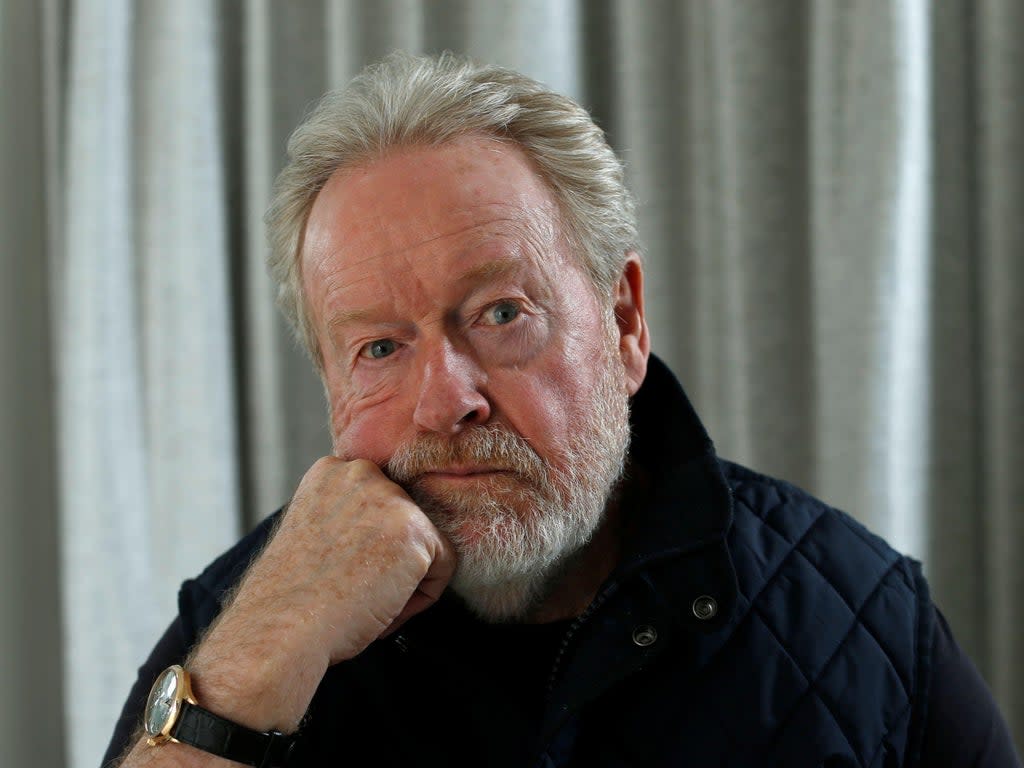Ridley Scott: ‘Cinemas should not be allowed to go away’

Sir Ridley Scott is a man who doesn’t look his age. Sandy-haired and sprightly, the 83-year-old Gladiator director could easily pass for 20 years younger, and with the energy and enthusiasm of someone half that. This winter, he has two films out – medieval saga The Last Duel and true-life drama House of Gucci – but he’s already looking 18 months ahead. “It’s just ‘next’ and I just move on,” he says, when we speak at the Venice Film Festival. “To me, my job is not work. It’s a passion.”
The Last Duel almost brings him full circle, back to his 1977 debut The Duellists, which won him Best First Feature at the Cannes Film Festival and set this former TV commercials director on a path to Hollywood that then saw him make back-to-back classics Alien and Blade Runner. But while that early-1800s tale was pistols at dawn, The Last Duel spirits audiences to Normandy in the late 1300s – just before the Crusades era that Scott explored in 2005’s Kingdom of Heaven.
Based on a true story, the script comes from Matt Damon and Ben Affleck – who also star, along with Star Wars’s Adam Driver and Killing Eve star Jodie Comer. Damon and Affleck’s first script together since they won an Oscar for co-writing 1997’s Good Will Hunting, it’s been penned in collaboration with writer/director Nicole Holofcener (Oscar-nominated for her script for Can You Ever Forgive Me?), with each taking on a chapter in this multi-perspective tale about two noblemen who are drawn into a fight to the death. Think jousting, swords, mud and, in the case of Damon’s knight Jean de Carrouges, a very bad mullet.
That may be doing the film a disservice; it is actually a resonant drama surrounding the case of Carrouges’s wife Marguerite (Comer), a 14th-century noblewoman who is raped by Jacques le Gris (Driver), the pernicious advisor to Affleck’s powerful Count Pierre d’Alençon. Marguerite, in this patriarchal world, has no standing. Jean de Carrouges must fight le Gris; if he loses, the consequences for Marguerite will be fatal. The film plays out events from, first, Jean de Carrouges’s point of view, then le Gris and finally Marguerite.
It was an idea that Akira Kurosawa mastered in 1950’s Venice-winning Rashomon, which was enough to intrigue Scott. “Just in principle, to see it from three different points of view … sounded to me like a great idea,” he says. “Which it was. The most important context, and point of view, is clearly from Marguerite. And then I think the next one is from her husband, who simply tends to believe that she was adulterous. Which is another attitude of the time. Then lastly, of course, the man who committed the act, who actually believes he did no wrong.”
Inevitably, a story about a sexually abused woman who tries, with dignity, to make herself be heard and point to the perpetrator draws parallels to the Harvey Weinstein case, and the subsequent fallout in Hollywood, as myriad accounts of abuse and exploitation emerged. Is this a film, on some level, addressing industry guilt? “We didn’t design it that way,” says Scott. “Inevitably because of its subject and the way it’s done, it does circle that question. If it does, great; if it answers questions in a good way even better.”
Scott had to face such issues head-on when allegations against Kevin Spacey surfaced in 2017. He had just shot Getty family drama All the Money In The World, with Spacey as billionaire John Paul Getty, and took the swift decision to recast the role, hiring Christopher Plummer and re-shooting all of Spacey’s scenes. As Scott later said, “I didn’t agonise. I never dwell on a problem, only the solution. You learn to do that, doing what I do.” The film went on to earn Plummer an Oscar nomination and score $56.9 million in box office receipts – no bonanza, but arguably more than if a toxic Spacey had been left in it.

Since then, Scott has been busy beavering away on The Last Duel, which got shut down for six months during the pandemic and only resumed shooting in October 2020 in Ireland, under strict Covid protocols. Known for his rapid-fire shoots (“actors don’t want to do 38 takes, they want to do two or three”), one can only imagine how apoplectic he must’ve gone when coronavirus forced the hiatus.
Certainly Scott comes from the no-nonsense school of directing. He talks about the visors that Damon and Driver wear during the duel, which have been sliced in half, partially revealing their faces. Visually, it allows the audience to see who is fighting whom, but in reality, it was anything but accurate. “I cut the visors in half. And the historian said: ‘That wouldn’t have been.’ I said, ‘Well, it is now.’” It paints a delicious picture of a quaking historian facing down with Scott.
Given how many times Scott has worked in historical drama, he’s not big on trawling through history books. On Gladiator, which gained him one of four career Oscar nominations? “People say, ‘What did you research for the Roman Empire?’ I said ‘Nothing.’ I looked at some pictures and thought, ‘Let this work.’ The biggest investment I ever made in my career was to go to an extremely good art school. And that has fed me all my life. I never went to film school. And so I will look at a few pictures and I get transformation up here,” he says, tapping his skull. “And I work like that.”

Born in South Shields, County Durham, Scott was 21 when he was accepted into the Royal College of Art in 1958 to study graphic design, a decade before he and his late brother Tony founded RSA (Ridley Scott Associates) and began directing adverts. He has admitted that he realised early "I would never make a painter", yet he still loves the discipline. “I paint all the time,” he says. It’s his way of relaxing, alongside visiting his vineyard in Provence. “That’s my holiday,” he says. “My wife … loves to go to Costa Rica to see her sisters. That’s great. Because she likes the sea and I don’t.”
With two grown-up sons, Jake and Luke, and a daughter Jordan – all directors – from previous marriages, his third wife is the Costa Rican actress-producer Giannina Facio, whom he’s been with since he made the 2001 Silence of the Lambs sequel Hannibal. It was Facio who first brought to Scott’s attention his second movie to arrive this year, House of Gucci, a story he’s been toying with for years.
A juicy-sounding tale of murder and intrigue, it deals with the assassination of Maurizio Gucci, head of the Italian fashion empire, who was shot dead in 1995 by a hitman hired by his ex-wife. Scripted by the London-born Roberto Bentivegna, Scott’s Last Duel star Adam Driver plays Gucci, alongside Lady Gaga, Al Pacino and Jared Leto in a drama the director feels is less about haute couture and more about “obsession and passion”.

Already Scott’s planning to shoot a Napoleon drama in January – a subject that even defeated Stanley Kubrick – entitled Kitbag, with his Gladiator actor Joaquin Phoenix. He’s also got a sequel to Gladiator in the works “for the end of next year”. “That’s how we work,” he says. “We tend to work 18 months ahead. Otherwise, you have these horrible gaps. You finish the movie, and if you haven’t thought what else you’re gonna do next … you’re hoping something good’s gonna land on your desk. It never does.”
He refuses point blank to tell me anything about Gladiator 2 – “No! No!” he cries– but he’s more vocal about the Alien franchise, which he resurrected with 2012’s origin story Prometheus. “I never showed an alien in it” – it still made $404 million at the box office – “and the studio … said, ‘See, it didn’t do so well!’ Really?” He returned with 2017’s Alien: Covenant, “put the aliens back in there”, and the film made much less: $240m worldwide. “When you’ve got a marvellous beast, it does wear out and you have to actually think again.”
The franchise is now being rebooted as a TV series by Noah Hawley (who successfully turned Fargo into a long-running show). Wherever they go, whatever they do, “It’ll never be as good as the first one,” he grins. “That’s what I’ll say.” Our time is almost nigh, but not before conversation turns to the fate of the big screen versus streaming platforms. Scott, wisely, recognises that some movies work well on Netflix et al. But he’s a big-screen director. Always has been. “The film is gonna be more powerful in cinema. It should never go away. It should not be allowed to go away.”
‘The Last Duel’ is in cinemas from 15 October. ‘House of Gucci’ opens on 19 November
Read More
Lashana Lynch on ear for eye, Bond and why there’s still a long way to go for change
Barbara Hershey: ‘If we treat the elderly like children, they start acting like children’
Will Benedict Cumberbatch finally win an Oscar?
Barbara Hershey: ‘They called Beaches a chick flick, which I found really offensive’
Todd Haynes on Velvet Underground: ‘Everybody was objectified at Warhol’s Factory’
Comic books are doing everything superhero films aren’t for queer representation

 Yahoo Movies
Yahoo Movies 
